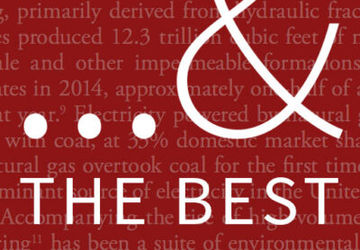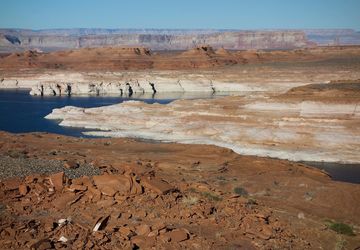Students and staff posing for a Zoom screenshot at the Rural Family Pod kickoff event in November.
A place for incoming rural students to connect with classmates who share their experiences, Rural Family Pods help build community at Stanford.
Tom Schnaubelt, executive director of the
Haas Center for Public Service and associate vice provost for education, grew up on a farm in Wisconsin. This isn’t something he keeps secret, he says, but over his time at Stanford, “it became clear to me that no one said, yeah, so did I.” Although 20% of Americans live in places the U.S. Census Bureau defines as rural (outside of incorporated cities and towns with 2,500 residents or more), fewer than 5% of Stanford undergraduates come from these places. Having noticed the underrepresentation of rural Americans at Stanford, Schnaubelt forged a partnership between the Haas Center and the
Bill Lane Center for the American West to begin raising awareness and building community around issues of American rurality.
This fall, the Haas Center and the Bill Lane Center co-sponsored a new initiative for rural community building -- a series of Rural Family Pods (RFPs), groups of four to six students hailing from rural America, each with a mix of first-year and upperclass students. The pods provide an opportunity for incoming students to connect with those who have faced similar challenges and observed similar dissonances between their lives at Stanford and at home.
The idea stemmed from conversations last February at on-campus dinners organized around the rural student experience. At each of these, students expressed a desire for further connection around what Schnaubelt described as “an identity that’s not a visible identity.” Originally, students coalesced around the idea of an Admit Weekend event for rural students. However, when the COVID-19 pandemic hit, there was a need to pivot to remote methods of engaging incoming students. Thus, Jordan Ferré’s (‘21) idea for Rural Family Pods took off.
Mia Loposser, ‘23, has been a leader in convening the RFPs. This fall, she helped create an interest form for incoming freshmen as well as upperclass students, collecting information about their academic and extracurricular interests, and -- importantly, during remote learning -- their time zones. Using this, they matched students into eight groups of four to six students. The RFPs were launched at a group Zoom event in November of 2020, where students were able to meet their pod members and reflect on the experiences of rural students at Stanford (include word cloud screenshot). Initially, the plan was for the pods to come together three times virtually before the January arrival of first-year students on campus; with Stanford’s change of plans, the pods have continued to be a source of community and remote connection for incoming students.
Loposser, who came to Stanford from Logansport, Indiana, herself participates in an RFP. The members of her pod, she says, connect over their academic interests in medicine in addition to their shared backgrounds. They’re able to make use of a group text chat, as well as video chat occasionally. She finds this especially helpful during the pandemic, when “everyone lacks the ability to make connections.” Loposser is currently on campus, as is another member of her RFP, and they were able to meet outdoors as well.
Loposser also notes some of the shared concerns rural students face. “Everyone at Stanford is used to working hard,” she says, but for rural students, “most of our schools didn’t offer very rigorous classes,” and so they had to make use of opportunities such as local community colleges to pursue their interests. “Duck syndrome,” used at Stanford to describe the rapid foot-paddling students are often doing underwater while maintaining a relaxed demeanor in a highly competitive academic environment -- is amplified for rural students, Loposser says. Many have a sense of feeling behind their classmates whose high schools emphasized AP or IB courses. Given the overall lack of rural students at Stanford -- something she hadn’t been expecting -- Loposser finds it energizing to connect with peers who are more likely to recognize her stories about home. Loposser also notes that some of the heavier issues facing rural America figure in to her and her peers' backgrounds --"things like motor vehicle deaths being 3 to 10 times higher or suicide rates being higher in rural areas lead to rural students coming to college having experienced more trauma than the average urban student," another set of experiences it's been helpful to talk about with her RFP. She hopes discussing the adjustments to Stanford she was and wasn’t prepared for with first-year students will better prepare them for their eventual arrival on campus.
Word cloud generated by students at the RFP kickoff event.
Students who have connected through the RFPs are organizing other related events on campus. In winter and spring of 2021, the Haas Center and Bill Lane Center are co-sponsoring the
Exploring Rural America Speaker Series, with the goal of facilitating “discussion that cultivates understanding, empathy, and trust, particularly between individuals with different rural and urban experience.” The first session, “
Exploring Rural America: An Entertaining Introduction,” featured author and humorist Michael Perry. Moderated by Nick Hakes ‘22, the online event attracted an audience of 150 -- including many participants in the RFPs. Future sessions feature speakers such as John S. Cullen (February 23, 2021) and Marie Mutsuki Mockett and Juston Wolgemuth (March 9, 2021). Schnaubelt, Loposser, and their colleagues expect these to be just the beginning of opportunities for connection around domestic rural issues at Stanford.




